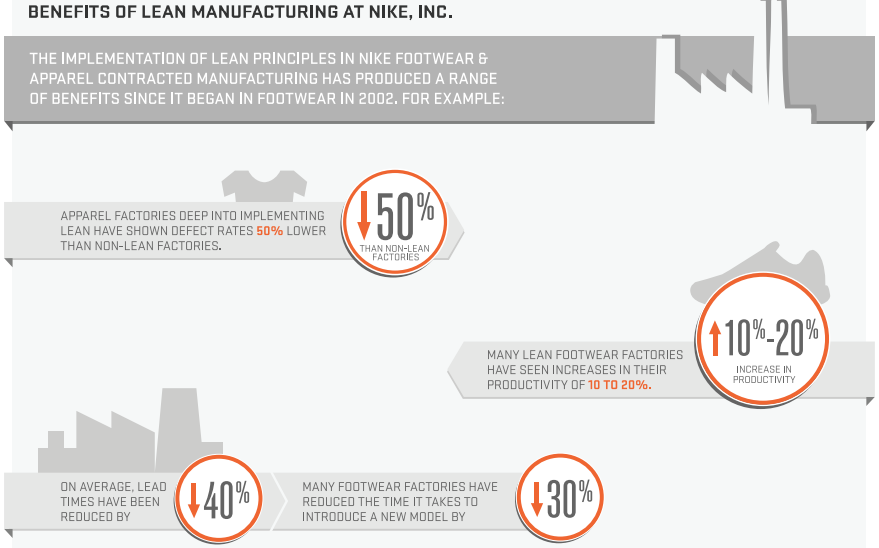I wrote before about the joke of Walmart’s “ethical sourcing” policy. Importers have asked me several times for examples of successful CSR (Corporate Social Responsibility) strategies, and I had trouble coming up with real cases.
Tchibo, a German retailer, launched a voluntary program with 100 key suppliers. It is mostly based on improving communication between management and workers. It goes in the right direction, even though it is a bit too superficial to my taste.
But I found a much better example with Nike.
How lean helps improve working conditions… as well as quality, speed, and productivity
According to their Sustainable Business Performance Summary for fiscal year 10/11:
Worker surveys indicate a significant increase in the satisfaction of workers in factories that have implemented lean manufacturing, which we attribute to increased awareness among factory managers of what good human resources (HR) management looks like and better capacity to implement it.
Finally! A major buyer that works on improving the fundamentals — on how work is planned, organized, and really done.
And they are also seeing clear benefits that translate into bottom line results:
As a result, Nike decided to make it a requirement. All their contract manufacturers need to be engaged in a lean transformation by 2015.
Very few companies, even in the car industry, have made lean a requirement for all their suppliers. Most retailers simply require a certain score on social audits, but don’t bother giving factories guidance on how to achieve these scores through better management of their business.
2. How Nike prevents subcontracting
Setting high requirements is nice, but one first needs to ensure that all production is done on site.
The first thing Nike does, when signing a contract with a new manufacturer, is to make subcontracting clearly forbidden but also very difficult. All the work has to be done in one designated building with good sight lines.
I just read about this in the 2nd edition of Jim Womack’s Gemba Walks book. Nike approached a few faculty members of the Lean Enterprise Institute to run experiments and see how lean principles could be applied to their suppliers.
Unfortunately, there are no more details because “Nike Operating System activities are practically a secret”.
I really wish they gave more information, so that other buyers could emulate their approach with more confidence.


“The first thing Nike does, when signing a contract with a new manufacturer, is to make subcontracting clearly forbidden but also very difficult. All the work has to be done in one designated building with good sight lines.”
This is a nice idea in theory but once the Nike leaves the factory gate and the factory has the PO in hand, Nike or any customer for that matter is at the mercy of the factory. I mean, if Nike puts in an order for 50,000 units with a factory that only has capacity for 30,000 pcs you can be sure the factory will take on the 50,000 pcs and farm the rest out to one of their sub suppliers down the road.
Ronan,
Yes sure, I agree with you. I wrote it is “difficult”, not “impossible”. And I am sure Nike checks the factory’s capacity before issuing orders.
If we contrast this with Walmart’s approach (saying “it is forbidden” but not doing anything to make if difficult), I prefer Nike’s approach.